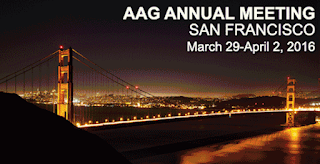Call for papers: AAG 2016. San Francisco. 29th March – 2nd April
Symposium on Human Dynamics Research: Urban Analytics
A deluge of new data created by people and machines is changing the way that we understand, organise and model urban spaces. New analytics are required to make sense of these data and to usefully apply findings to real systems. This session seeks to bring together quantitative or mixed methods papers that develop or use new analytics in order to better understand the form, function and future of urban systems. We invite methodological, theoretical and empirical papers that engage with any aspect of urban analytics. Topics include, but are not limited to:
- New methodologies for tackling large, complex or dirty data sets;
- Case studies involving analysis of novel or unusual data sources;
- Policy analysis, predictive analytics, other applications of data;
- Intensive modelling or simulation applied to urban areas or processes;
- Individual-level and agent-based models (ABM) of geographical systems;
- Validating and calibrating models with novel data sources;
- Ethics of data collected en masse and their use in simulation and analytics.
Please e-mail the abstract and key words with your expression of intent to Nick Malleson (n.s.malleson@leeds.ac.uk) by 22nd October, 2015 (one week before the AAG session deadline). Please make sure that your abstract conforms to the AAG guidelines in relation to title, word limit and key words and as specified at:
http://www.aag.org/cs/annualmeeting/call_for_papers
An abstract should be no more than 250 words that describe the presentation’s purpose, methods, and conclusions.
Timeline summary:
- 22nd October, 2015: Abstract submission deadline. E-mail Nick Malleson by this date if you are interested in being in this session. Please submit an abstract and key words with your expression of intent.
- 25th October, 2015: Session finalization and author notification
- 28th October, 2015: Final abstract submission to AAG, via www.aag.org. All participants must register individually via this site. Upon registration you will be given a participant number (PIN). Send the PIN and a copy of your final abstract to Nick Malleson. Neither the organizers nor the AAG will edit the abstracts.
- 29th October, 2015: AAG registration deadline. Sessions submitted to AAG for approval.
Organizers
- Nick Malleson, School of Geography, University of Leeds
- Alex Singleton, School of Environmental Sciences, University of Liverpool
- Mark Birkin, Director of the University of Leeds Institute for Data Analytics (LIDA)
- Paul Longley, Department of Geography, University College London
- Andrew Crooks, Department of Computational and Data Sciences, George Mason University.
- Seth Spielman, Geography Department, University of Colorado
Continue reading »














